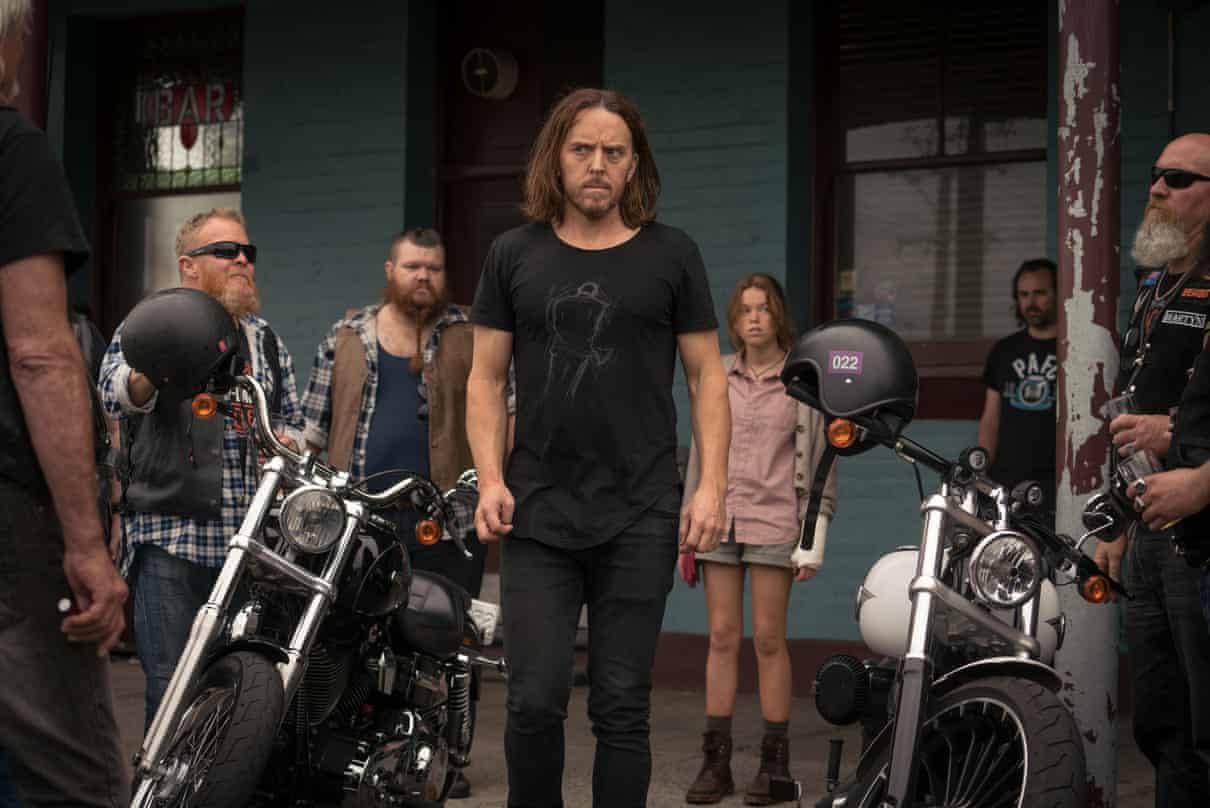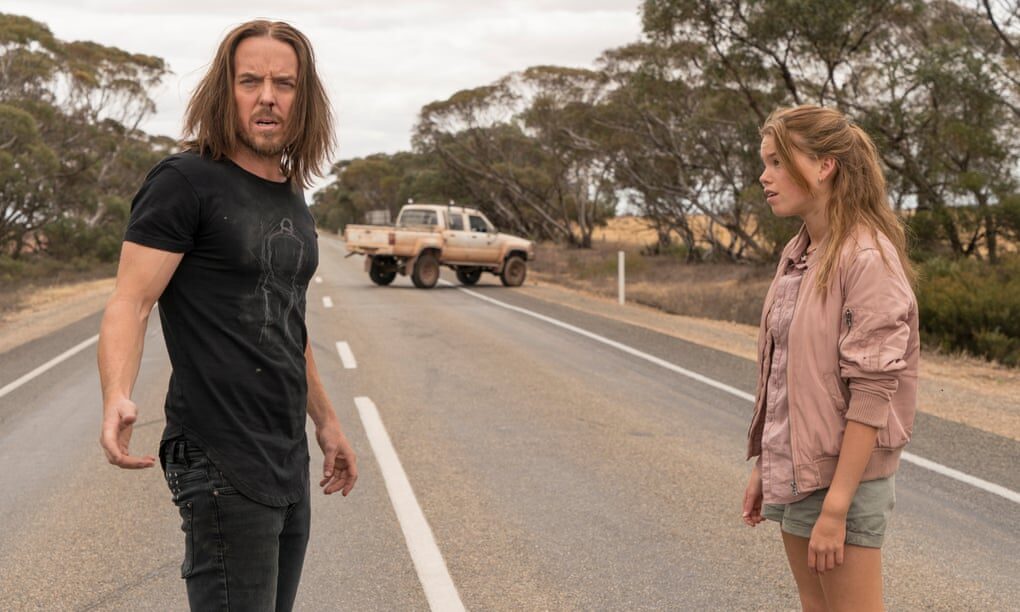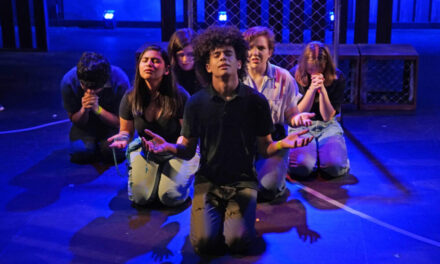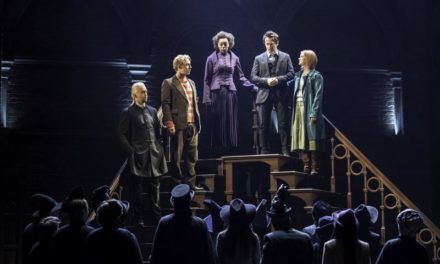Upright, a new Australian television drama, co-written by and starring the multitalented Tim Minchin (composer of Matilda the Musical and Groundhog Day), is a special show. Premiering on August 6 in the United States on Sundance Now, Upright follows Lucky, a 40-something-year-old, washed-up former rock star as he travels across the Australian desert to return home after his self-imposed exile. Accompanied by his old, upright piano (hence the show’s title), Lucky’s plans become quickly complicated as he, quite literally, crashes into the sharp and sardonic runaway teenager, Meg, played by Casting Guild of Australia’s 2018 Rising Star Award recipient Milly Alcock. Together they embark on an Outback odyssey as adoptive father and daughter.

Lucky (Tim Minchin) and Meg (Milly Alcock) in Upright. Photograph: Matt Nettheim
Minchin’s primary training is in the theatre; in addition to his work as a musical composer, he has performed the title roles in Perth Theatre Company’s 2006 Amadeus and 2004 Hamlet. He also starred in the Sydney Theatre Company’s 2013 Rosencrantz and Guildenstern are Dead. Following up Olivier-award winning musicals Matilda the Musical and Groundhog Day, Minchin is currently in the process of writing another musical. It’s easy to see Minchin’s stage background influencing Upright, particularly with its gigantic characters, emphasis on human emotion, and tight dialogue.
Upright is a fun, high-quality series that successfully hits a myriad of marks. The plot is gripping as these two outcasts race against the clock toward Perth; Lucky is pursuing his family, Meg escaping hers. On the way, the pair face troubles not limited to poisonous snakes, feral camels, theft, and an illegal fight club.
In describing Upright, Tim Minchin says:
“It’s important to me that people know Upright is a rollicking adventure and it’s really entertaining and funny.
“We hope the viewer has a great time but we also hope [the show] invokes questions about how much we can control our lives and how life is arbitrary and the universe is chaotic. How do we find peace and realize that we can’t control everything? It’s all old wisdom and no one is saying anything new, but I think Upright is a new way to talk about it.
“I hope our show tells a story about what it is to be human in a way that is funny and sad. I think the way you want to engage life should be balanced. In the same, we try to balance this TV show.

Lucky (Tim Minchin) and Meg (Milly Alcock) in Upright. Photograph: Matt Nettheim
Upright’s strength lies in its existential themes. They do not exist as an afterthought, but rather they are elevated by the medium of television comedy-drama. From the prelude to its satisfying coda, Upright answers core philosophical questions on the nature of human goodness and what it means to live in a chaotic and random world. Upright has been advertised as a feel-good road-trip, and it is. But it’s also a wonderful surprise to see the show’s true colors and depth shortly almost immediately after the journey begins.
Philosophy-cum-comedy is Tim Minchin’s forte. When regarding his musical, Groundhog Day, Minchin says,
“The stuff I pull toward making is basically existential. There are so many connections between this [Upright] and Groundhog Day. The journey of the protagonist of Groundhog Day is going from thinking he’s sophisticated and trying to control his world with his cynical, too-good-for-this attitude, through to trying to control his world by being benevolent.”
Similarly, Minchin describes the creation of Upright with the same depth.
“I thought this is a fantastic premise but I didn’t really want to write a sitcom. I was in the process of moving from LA back to Australia. [My family and I were] trying to work out what home was, where we belong, what it was to leave yet another city and another group of friends, and another community that we created. We left Perth and then left Melbourne and then left London and then left Hollywood, and every time it broke our hearts. There was a sense of, “Was that my youth gone? Am I going to settle?” I wanted to put all those feelings in the show. I don’t see the point in writing and not taking everything you have into it. That’s how you make [art] authentic.
“I was a little bit down and I wanted to add depth to the show. I thought the premise of a guy trying to cross the desert had epic bones. It sounds like something Biblical, or Greek, or Heart of Darkness. I thought this is a great opportunity to do something funny and grand, but with big themes about what it is to have been in exile from the people you love. The macro theme I’ve found myself writing over the last ten years and continue to write about is the question of meaning. Why do the stories we tell ourselves about the universe matter?”

Lucky (Tim Minchin) and Meg (Milly Alcock) in Upright. Photograph: Matt Nettheim
Tim Minchin is also the show’s composer, and music plays an integral role in the show beyond Minchin’s original, alt-rock compositions that he, as Lucky, performs throughout the series. Contemporary songs by Australian artists such as Sia and Tame Impala feature at key moments to further character development. Lucky muses about music throughout the series including a thoughtful parable regarding the death of ELO’s cellist in the first episode.
“At the end of Upright, you see that you get battered by life but it’s arbitrary. You might get a bit scared. You’ve encountered slings and arrows but all those bits of damage are what makes beauty. The damage in the story is the meaning. It’s not something you have to try to avoid. It’s something you have to wrap up into the narrative of your life. The piano at the end, with all those fractures and dings and out-of-tuney bits, are what make it a beautiful instrument.”
Before working on Upright, Minchin was working on a Dreamworks animated film that meant to star Hugh Jackman. However, the film never came to fruition after film executives shut the project down after four years of work. Minchin further spoke about what it means to make mistakes and lose dreams:
“I was trying to get my head around the fact that someone could waste four years of your creative life but, ‘one door closes and another opens’ and all that. What came out of that for me was Upright. It’s probably the thing I’m most proud of anything I made, really. So ironically, Upright is the beautiful thing that came out of the adversity of the Hollywood years.

Lucky (Tim Minchin) and Meg (Milly Alcock) in Upright. Photograph: Matt Nettheim
Given the themes of fate and destiny, it’s easy to look past plot devices: there’s a fair amount of arriving at just the right (or wrong) moment in the show. Tougher to ignore is the number of characters (other than Lucky and Meg) that behave in oddly non-realistic ways. Why would a crane operator bet his truck in a game of pool against a teenage girl? In comparison, the actions from the two leads are well-motivated and compliment the leads’ engaging acting and refreshing dialogue. Milly Alcock’s Meg has particularly sharp comedic timing that belies her ability to melt in slower moments of despair.
While the occasional odd decisions from the secondary and tertiary characters stick out, they don’t distract from the grander themes of Upright. The cinematography is gorgeous and could easily serve as a tourist advertisement for the Australian Nullarbor Plain. There are long shots of Lucky chasing Meg across endless, pink salt flats after she jokingly steals his car keys. Long highways, scorching hot and empty of life, stretch towards the horizon. Cliffs suddenly drop away into the Great Australian Bight.
There are too few stories today that address true forgiveness. Upright is one of those rare stories. It’s not a story of redemption, but a story of how you can forgive yourself, love your damaged soul, and appreciate the present for what it is.
This post was written by the author in their personal capacity.The opinions expressed in this article are the author’s own and do not reflect the view of The Theatre Times, their staff or collaborators.
This post was written by Rem Myers.
The views expressed here belong to the author and do not necessarily reflect our views and opinions.


















